Introduction
Progressive Web Apps (PWAs) have revolutionized the e-commerce landscape, offering seamless and engaging experiences that bridge the gap between web and native apps. These versatile applications have transformed how consumers interact with online storefronts, providing functionality, reliability, and efficiency. In this article, we will explore the numerous benefits of PWAs in e-commerce, including their key features such as fast loading speed, offline access, push notifications, responsive design, and easy installation.
We will also examine real-world case studies that showcase the success of PWAs in enhancing the online shopping experience. Additionally, we will discuss the cost-effectiveness of PWAs and their SEO advantages, as well as explore future trends in PWAs for e-commerce. By the end of this article, you will understand why PWAs are a game-changer in the e-commerce industry and how they can help businesses thrive in the digital marketplace.
Benefits of PWAs in E-commerce
Progressive Web Applications are more than just a trend in the e-commerce landscape; they are a pivotal shift in how consumers interact with online storefronts. The multi-dimensional quality of PWAs ensures functionality, reliability, usability, and efficiency. For example, the user-centric strategy of Ripley's PWA in Chile and Peru demonstrates how a retail giant can utilize this technology to improve the shopping process. Their app's goal was to facilitate quick, easy, and reliable purchasing from mobile devices, aligning with the omnichannel strategy and improving customer satisfaction.
Recent innovations in the retail sector, such as Dublin Airport's checkout-free store, underscore the growing expectation for seamless and expedient shopping experiences. Mobile-friendly content that connects with a broad audience plays a crucial role in meeting these expectations. The inherent interactivity of Progressive Web Applications sets them apart from traditional websites and aligns with the demand for quick commerce, a segment expected to grow to almost 40 billion U.S. dollars by 2027 in the U.S. market alone.
Despite some criticisms of the term 'PWA', the underlying technology continues to close the gap between web and native apps. They are universally accessible across major operating systems directly through the browser, highlighting their potential to transform online trading platforms. By focusing on user-centric designs and embracing the full spectrum of PWA capabilities, businesses can not only meet but exceed the digital expectations of today's consumers.
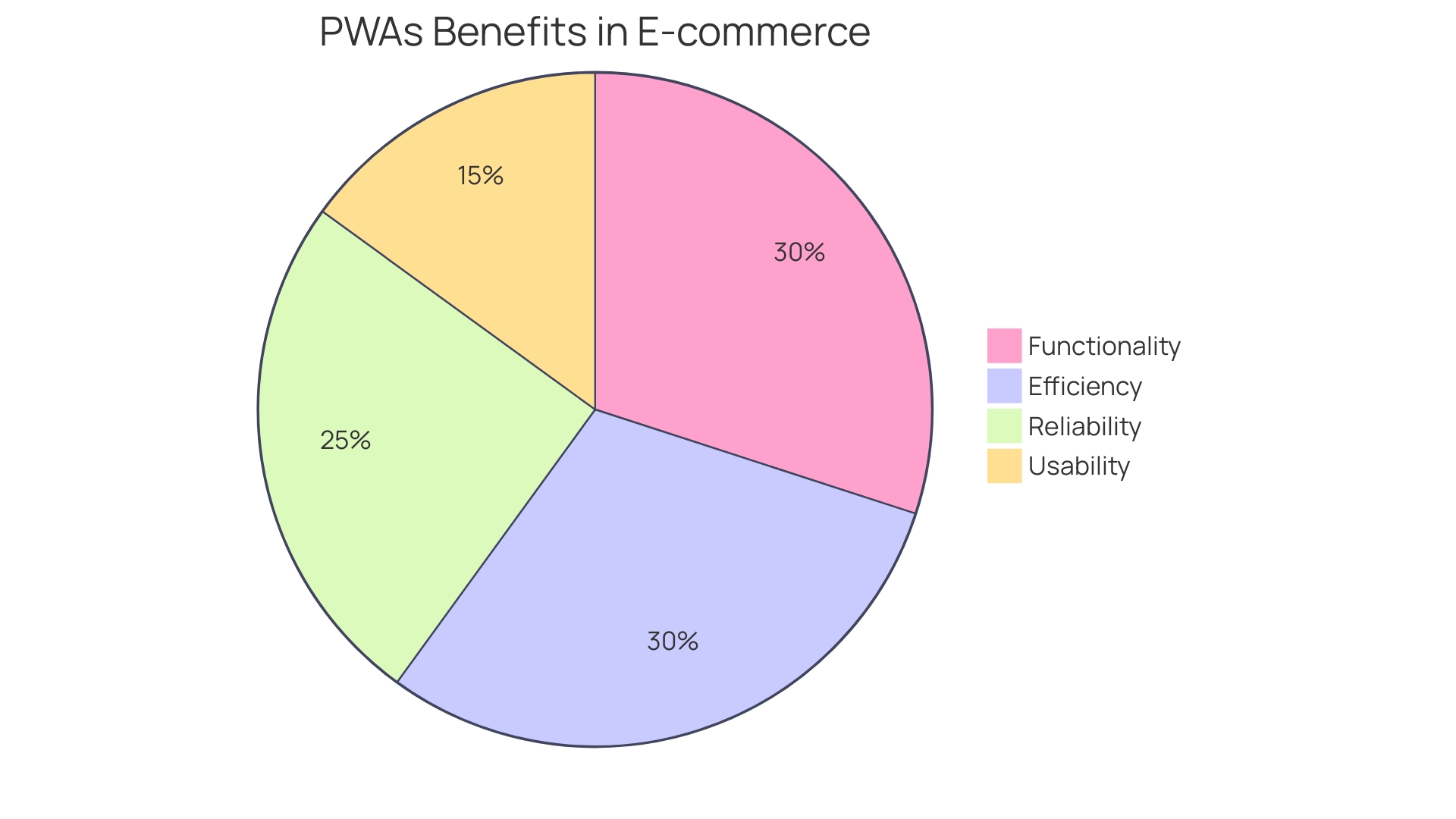
Key Features of PWAs for E-commerce
Progressive Web Applications are much more than just another technology trend; they represent a significant evolution in the digital storefront scene. By connecting the divide between web and mobile app encounters, Progressive Web Applications offer a degree of ease and usefulness that has the potential to transform e-commerce. By utilizing modern web capabilities, offline access and seamless interactions are provided, delivering an application-like feel directly through a web browser. With features such as push notifications and home-screen shortcuts, they keep users engaged and elevate the shopping experience to new heights. Real-world applications, like the innovative checkout-free store in Dublin Airport, showcase the seamless integration of technology that can be offered. Imagine the ease of entering a store, picking up items, and simply walking out while an intelligent system takes care of the payment process. That's the kind of instantaneous, reassuring service a well-implemented PWA can support. By offering content optimized for mobile devices and the opportunity to reach a broader range of people, progressive web apps (PWAs) serve as a valuable asset for businesses looking to leave a lasting impact in the highly competitive online retail industry.
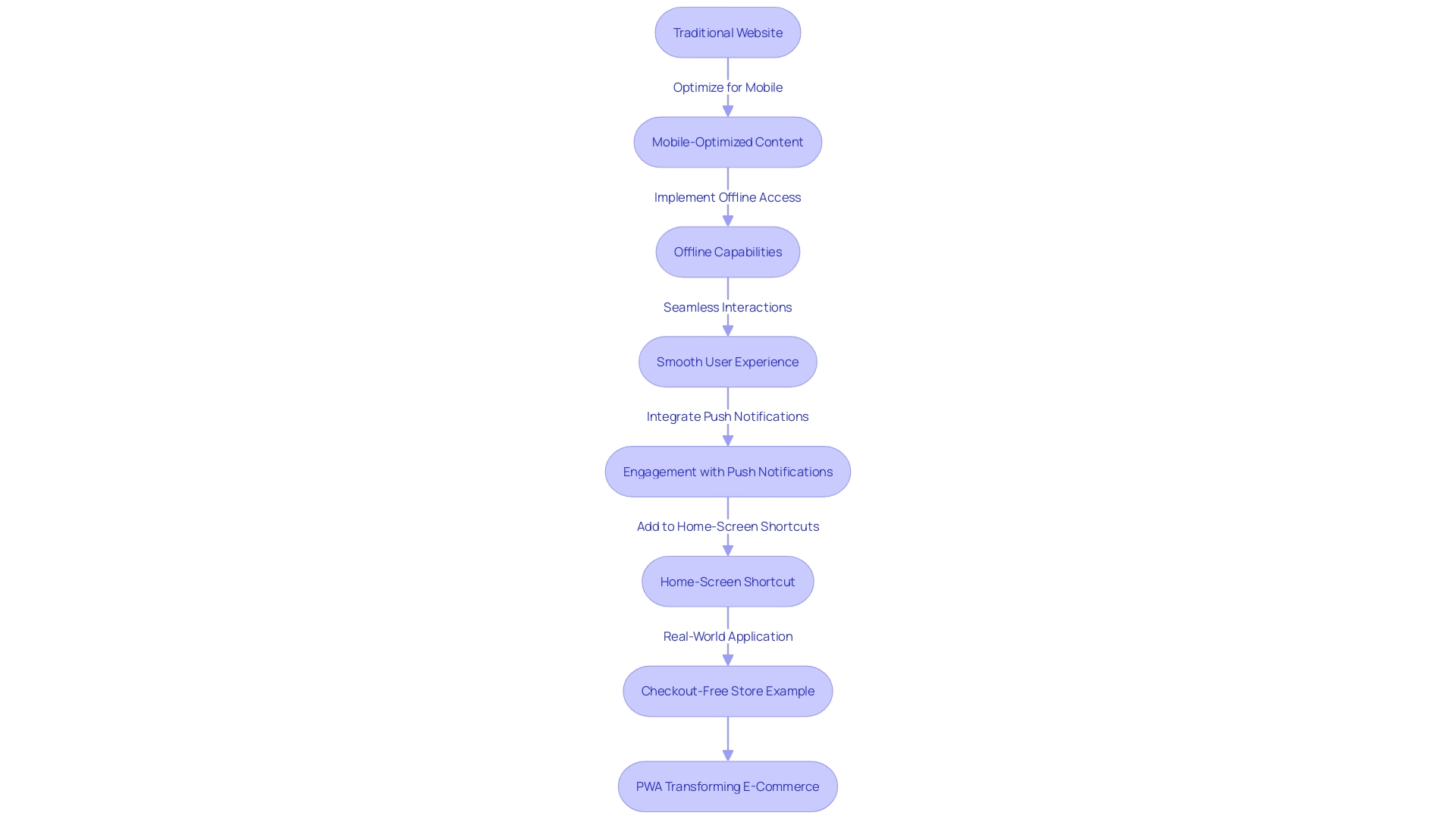
Fast Loading Speed
Progressive Web Apps, also known as PWAs, represent a substantial advancement in the digital commerce domain, providing rapid and dependable functionality that is essential for effectively captivating individuals. By utilizing progressive web applications, e-commerce platforms can guarantee fast content delivery, even in regions with unreliable network coverage, thereby enhancing the overall satisfaction of users.
The fundamental technology behind progressive web applications enables quicker page loads, which is not just a mere convenience but a business necessity. As evidenced by recent data from Fasthosts, even a one-second delay in load time can lead to substantial revenue loss—up to £26,379.45 for a business with 10,000 monthly visitors. This starkly underlines the need to optimize loading speeds to prevent visitor drop-off and maximize conversions.
Furthermore, Google's focus on prioritizing mobile-first indexing and enhancing user experience implies that these applications, which are inherently mobile-friendly and designed for speed, can have a positive impact on search engine rankings. Google's study reveals that if a mobile site takes longer than three seconds to load, 53% of visits are likely to be abandoned. Therefore, the smooth and almost immediate loading feature of progressive web applications can be a game-changer.
With successful implementations such as Starbucks prioritizing its ordering platform and Google Maps reaching a broader audience with its PWA, it's clear that this technology is not just about speed but also about strategic business growth. The combination of web and app features offers a lighter, faster alternative to traditional applications, and promotes a broader engagement base.
To sum up, the rapid loading speed of progressive web applications is not only a key benefit but also a vital element for the prosperity of online trade platforms, guaranteeing that users have instant entry to content, which in turn can result in enhanced conversion rates and a more robust online existence.
Offline Access
Progressive Web Applications are altering the landscape of online retail by providing a smooth shopping experience, even in situations where internet connectivity is difficult. With PWAs, customers can browse and make purchases through the convenience of their device's cache, which stores information and allows the app to perform offline. This technology enables individuals to shop at their own speed, without the interruption of losing connection. The capability of a PWA to function offline is not merely a contingency for inadequate connectivity; it's a strategic attribute that guarantees individuals stay involved with the brand, enhancing the customer journey and potentially boosting sales.
The offline capabilities of Progressive Web Applications are supported by advanced caching strategies, such as 'cache-first' and 'stale-while-revalidate', which manage data storage and retrieval efficiently. This means that whether a user is browsing through a subway tunnel or in a rural area with spotty service, the shopping experience remains uninterrupted. By harnessing the potential of progressive web applications, brands can have a substantial influence on consumers, expand their reach, and provide content that is optimized for mobile devices. With the ongoing evolution of technology, the difference in functionality between web and native app is narrowing down, which highlights the significance of modern storefront solutions in the digital market.
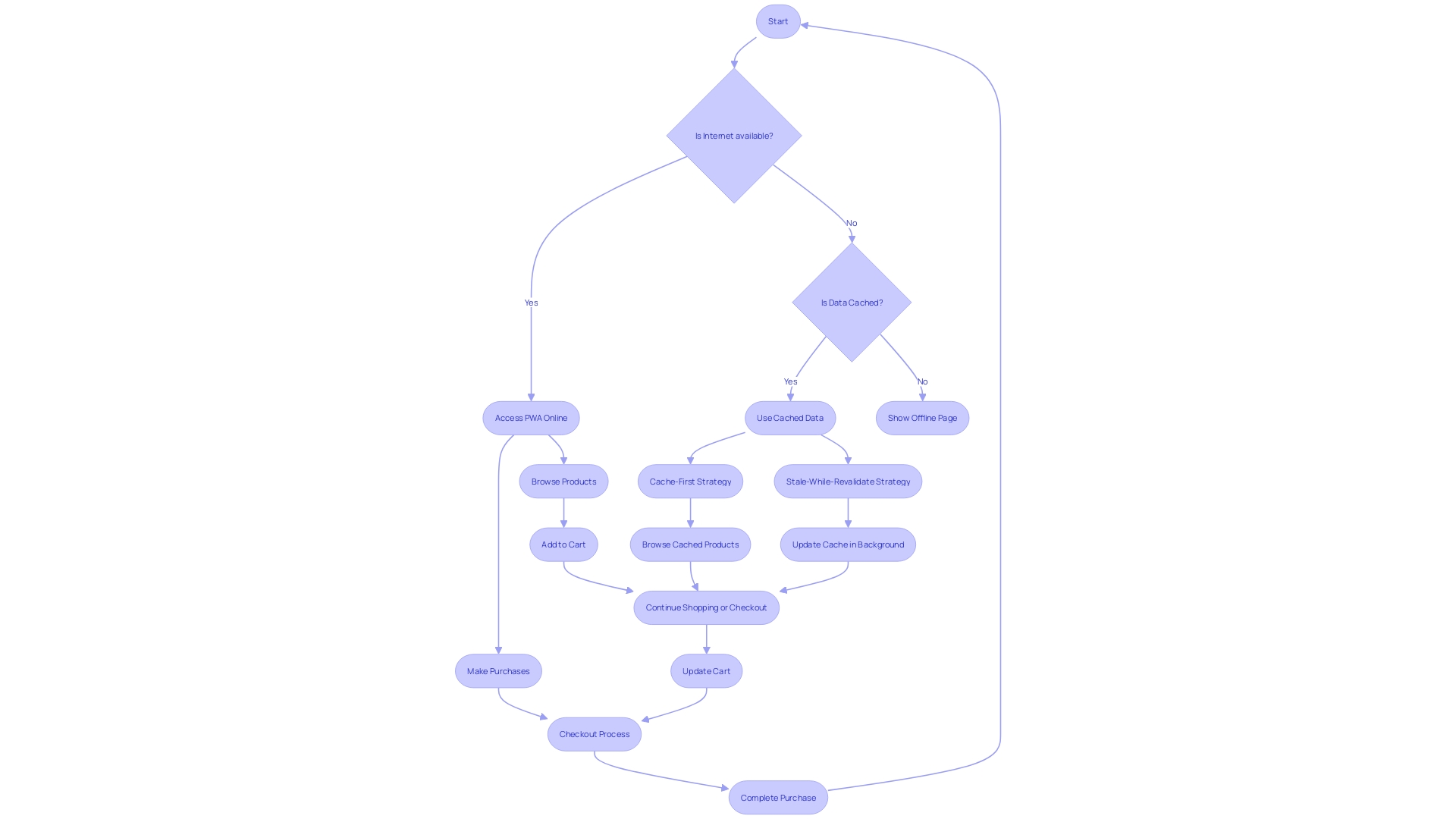
Push Notifications
Progressive Web Applications have transformed the way brands in online business engage with their audience, offering a variety of functionalities that utilize the most recent web technologies. A standout capability of PWAs is the integration of web push notifications. These notifications are a strategic tool for online business sites to enhance user engagement by delivering timely updates directly to the user's device. Push notifications can include alerts about new product launches, exclusive discounts, or upcoming promotions, enticing customers to revisit the online store and explore the latest offerings.
By implementing push notifications, businesses take advantage of the service workers, Push API, and Notification API, which work together to send these messages even when customers are not actively browsing the site. This novel approach has shown to be highly effective in keeping the brand top-of-mind and encouraging repeat purchases. For instance, an e-commerce site can alert a customer about a limited-time sale, prompting immediate action and fostering a sense of urgency.
Moreover, the use of push notifications in PWAs aligns with the growing demand for mobile-friendly content. Reports highlight that a seamless mobile experience is paramount in retaining customers, as they increasingly prefer the convenience of shopping on-the-go. With the correct approach, push notifications can be instrumental in a brand's digital marketing campaign, ultimately leading to enhanced user retention and a flourishing online platform.
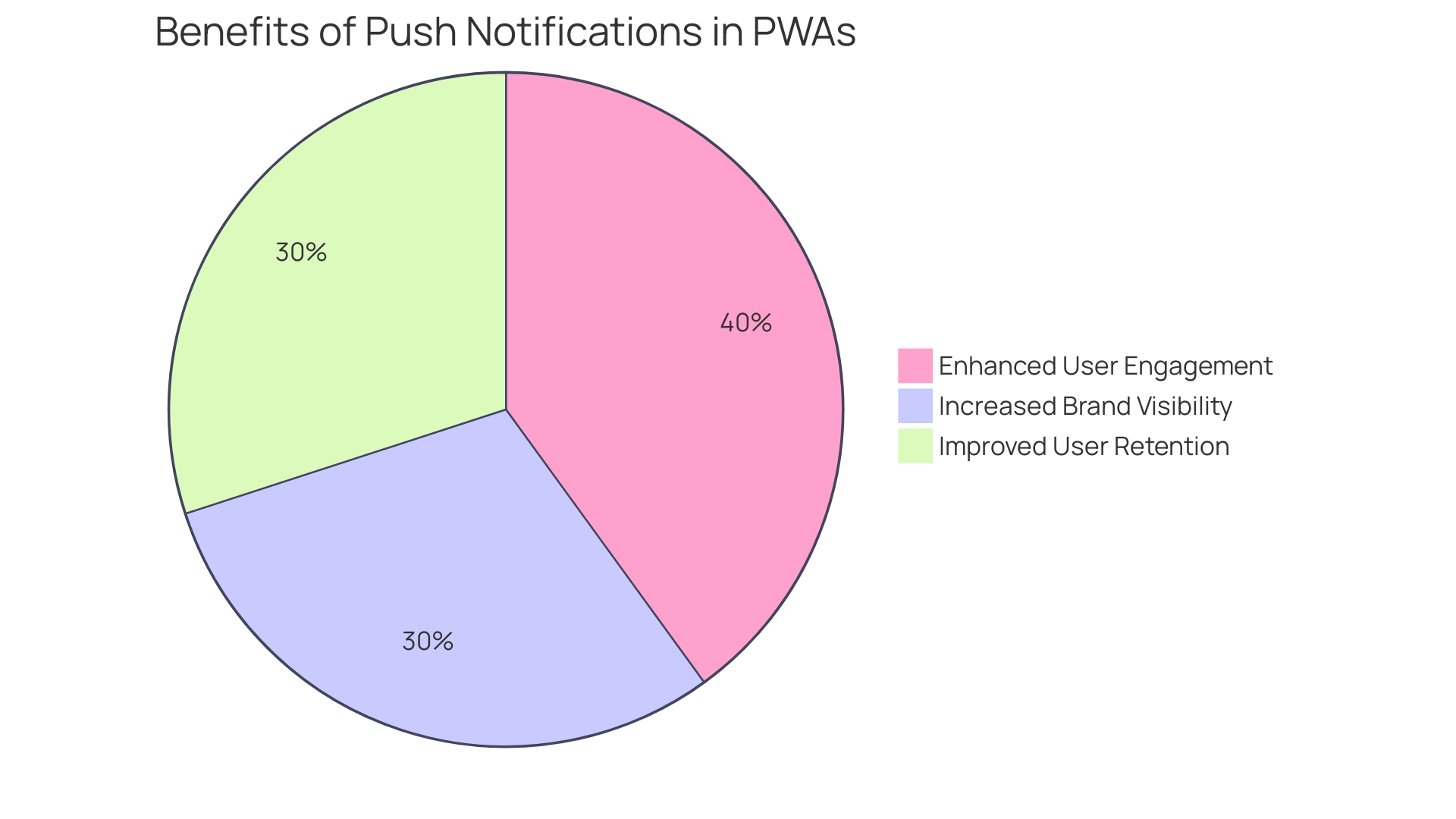
Responsive Design
Progressive Web Apps (PWAs) are revolutionizing the e-commerce landscape with their ability to seamlessly adapt to various devices and screen sizes, thanks to responsive design principles. This adaptability ensures that whether your customers are browsing on a desktop, a tablet, or a smartphone, they'll enjoy a consistent and optimized shopping experience. Highlighting the importance of mobile UX, statistics show that over half of website traffic is generated from mobile devices and that a mobile-friendly site can lead to a 15% higher conversion rate than average. Additionally, individuals are more inclined to revisit and share mobile sites that are easy to navigate, highlighting the need for responsive design in today's digital marketplace. In fact, a subpar mobile site can deter more than 50% of potential customers. Progressive web applications provide an answer to these challenges, offering a platform that not only fulfills but surpasses expectations for speed and usability on all devices.
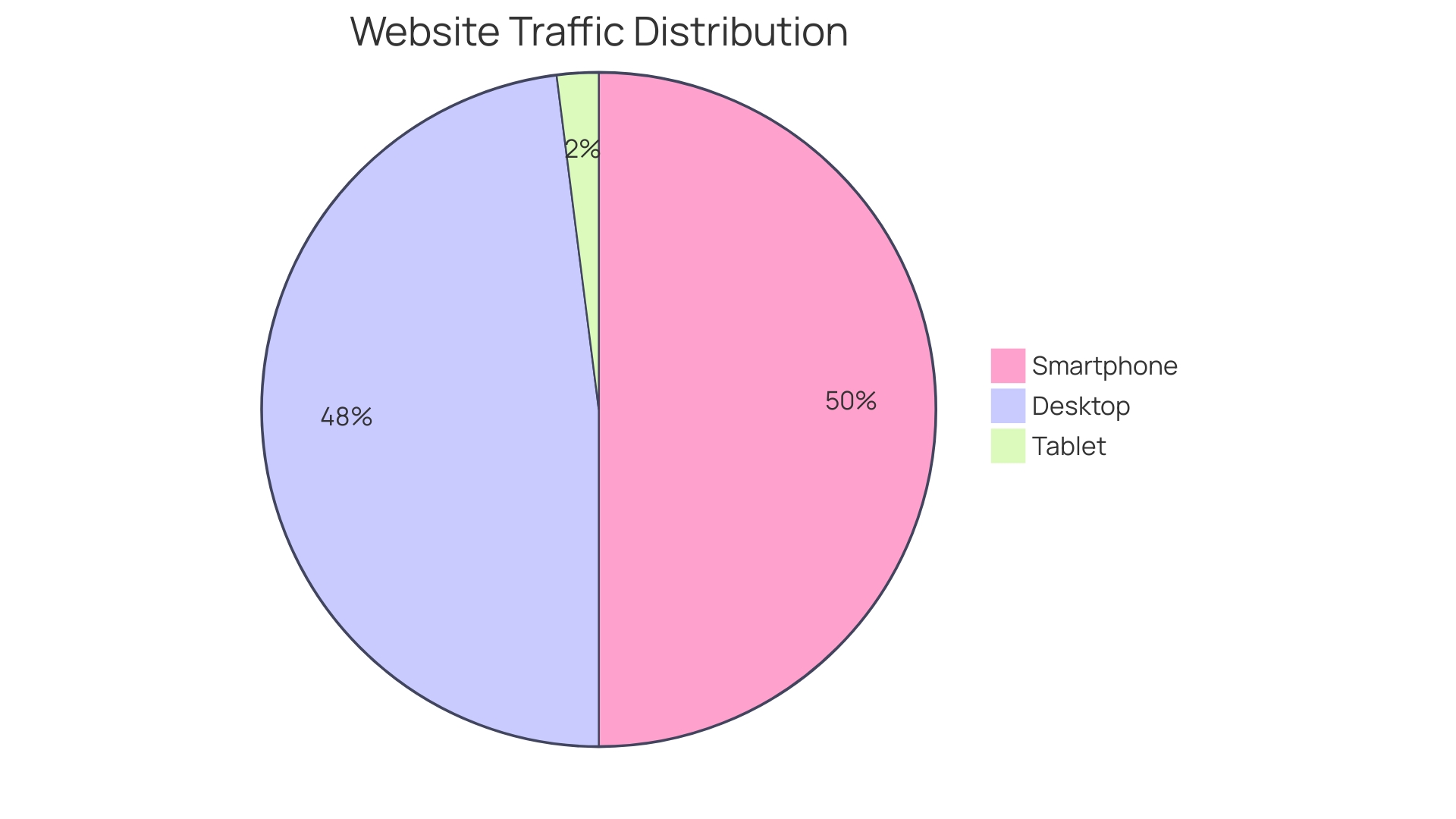
Easy Installation
Revolutionary web applications are transforming the way individuals engage with e-commerce platforms, merging the benefits of mobile applications and the availability of websites. Instead of conventional applications that need to be downloaded from app stores, Progressive Web Apps can be directly added to the home screen by the individual. This seamless installation process not only simplifies access to your online store but also enhances engagement and satisfaction.
PWAs are engineered to be fast, reliable, and engaging. With attributes such as offline functionalities, they guarantee that even in low-network situations, individuals can carry on with their shopping without any interruption. Statistics demonstrate the vital significance of mobile user interface, with over 50% of consumers unwilling to engage with a brand if faced with a poorly designed mobile site. Moreover, sites that load quickly on mobile devices see a 15% higher conversion rate, emphasizing the need for speed and efficiency in mobile commerce.
By utilizing the progressive enhancement principle, progressive web applications adapt to any device, delivering a consistent and high-quality experience across smartphones, tablets, and computers. The web app manifest, a key component of progressive web applications, allows the 'install to home screen' feature, making it indistinguishable from native apps and increasing the potential for repeat visits and conversions. Considering that almost 50% of internet traffic comes from mobile devices and users expect fast and user-friendly mobile websites, the prioritization of mobile experience in Progressive Web Applications (PWAs) is a revolutionary concept for businesses in the online retail industry striving to remain competitive in the digital market.
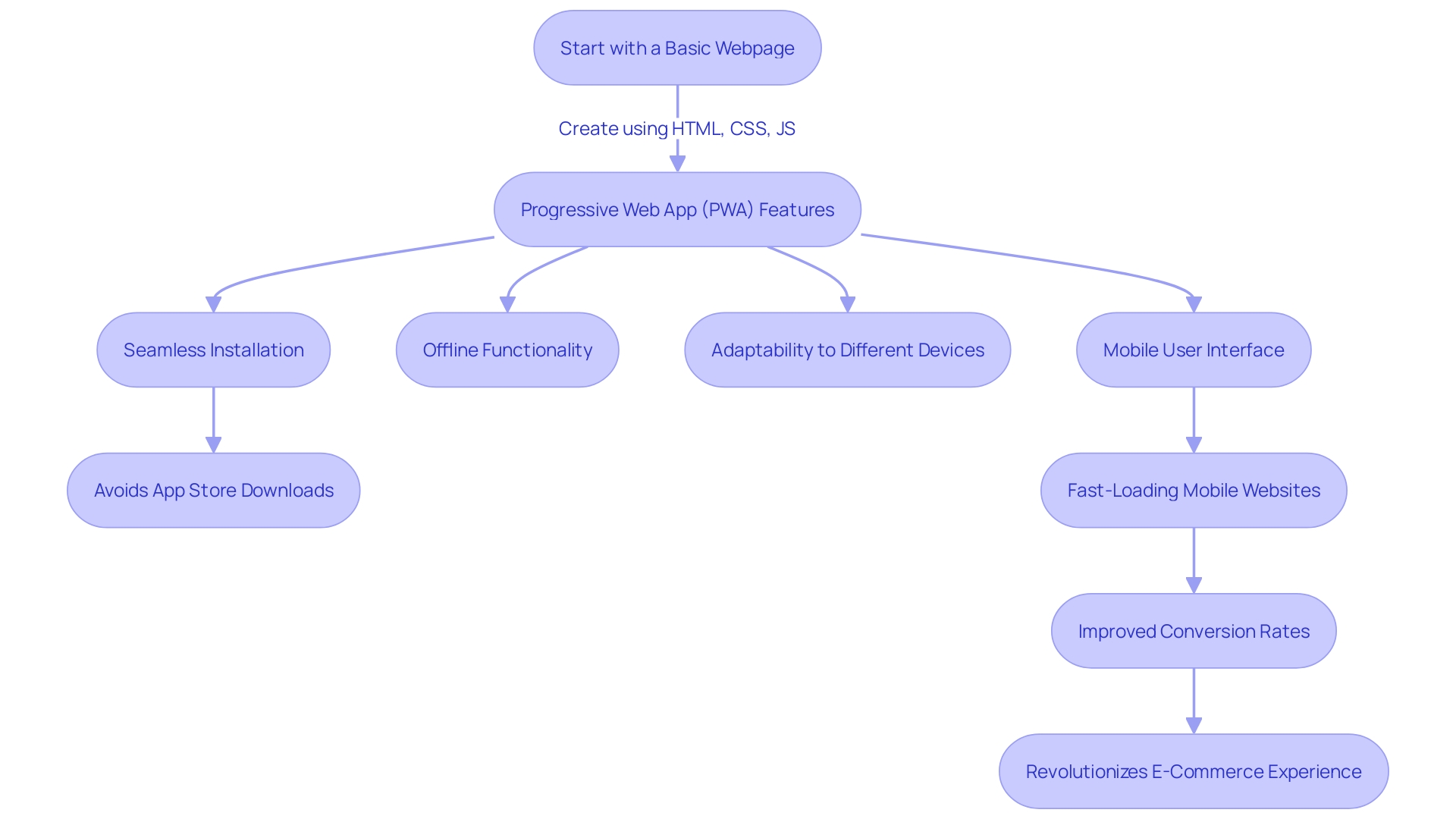
Case Studies: Success Stories of PWAs in E-commerce
Advanced web applications are changing the online business environment, allowing companies to improve their internet presence and interact with customers more efficiently. These hybrid solutions combine the best of web and mobile apps, offering a seamless, app-like experience directly from a web browser. With the capability to work offline, receive push notifications, and load rapidly even on unreliable internet connections, progressive web applications are a crucial tool for brands in the online business industry looking to remain competitive.
Recent success stories highlight the impact of PWAs on business growth. For example, Toni Ruiz Tubau, CEO at Mango, attributed the company's early adoption of online business for its capacity to expand into new markets, mentioning that Mango was one of the pioneers in Europe to embrace online sales. Their continuous drive to innovate is exemplified by their strategic expansion plans and the appointment of Marlies Hersbach to spearhead their e-commerce growth. This innovative strategy is a reflection of how businesses can harness technology to accomplish important goals and international recognition.
Furthermore, research and professional evaluation support the fact that executives at different levels of corporate structure acknowledge the significance of integrated business operations through technological progressions such as progressive web apps. They understand that aligning strategies and leveraging the right tools can bridge the gap between ambitious goals and tangible outcomes, a sentiment echoed in the insights shared by industry leaders.
In practice, building a PWA starts with basic web technologies – HTML for structure, CSS for styling, and JavaScript for functionality. This simplicity in creation belies the profound user experience enhancements a well-constructed PWA can provide, such as instant page loads and resilient performance even in unstable network conditions.
The recognition received by businesses that have excelled in leveraging Progressive Web Applications demonstrate their value. For example, companies recognized in the Heureka Group's awards for customer satisfaction and technical excellence exemplify the tangible benefits of adopting such innovative solutions.
Essentially, progressive web applications offer a strong opportunity for online businesses to enhance their sales and customer interaction, a fact that is becoming more evident in the achievements of companies that have embraced this technology.
Cost-Effectiveness of PWAs
Progressive Web Applications are more than just a fad in the online business scene; they symbolize a noteworthy change in how enterprises can engage with their customers. Combining traditional web technologies with the extensive knowledge of native apps, PWAs provide a smooth, mobile-friendly interface that can be accessed on various devices and platforms. This flexibility guarantees that online businesses can offer their customers a reliable and efficient experience without the significant resources usually needed for developing an app specifically for that purpose.
By utilizing a PWA, businesses can evade the complexity and cost of developing separate applications for iOS, Android, and other platforms. Instead, they can focus on a single, responsive solution that works everywhere. This approach not only simplifies the development process but also speeds up load times, which is crucial for retention and satisfaction. In fact, studies have shown that even a one-second delay in website loading can significantly impact customer decisions, potentially leading to substantial revenue loss. With the effectiveness of progressive web applications, online shopping platforms are well-prepared to manage internet traffic and uphold exceptional performance benchmarks, thereby guaranteeing a strong and dependable customer journey.
From a technical standpoint, creating a PWA involves starting with a basic webpage and progressively enhancing its functionality using HTML, CSS, and JavaScript. By including a service worker, offline capabilities and efficient caching strategies are implemented, guaranteeing uninterrupted continuation of shopping. As the online shopping market continues to grow, integrating progressive web applications into the digital strategy becomes a smart move for businesses aiming to remain competitive and fulfill the changing requirements of the digital economy.
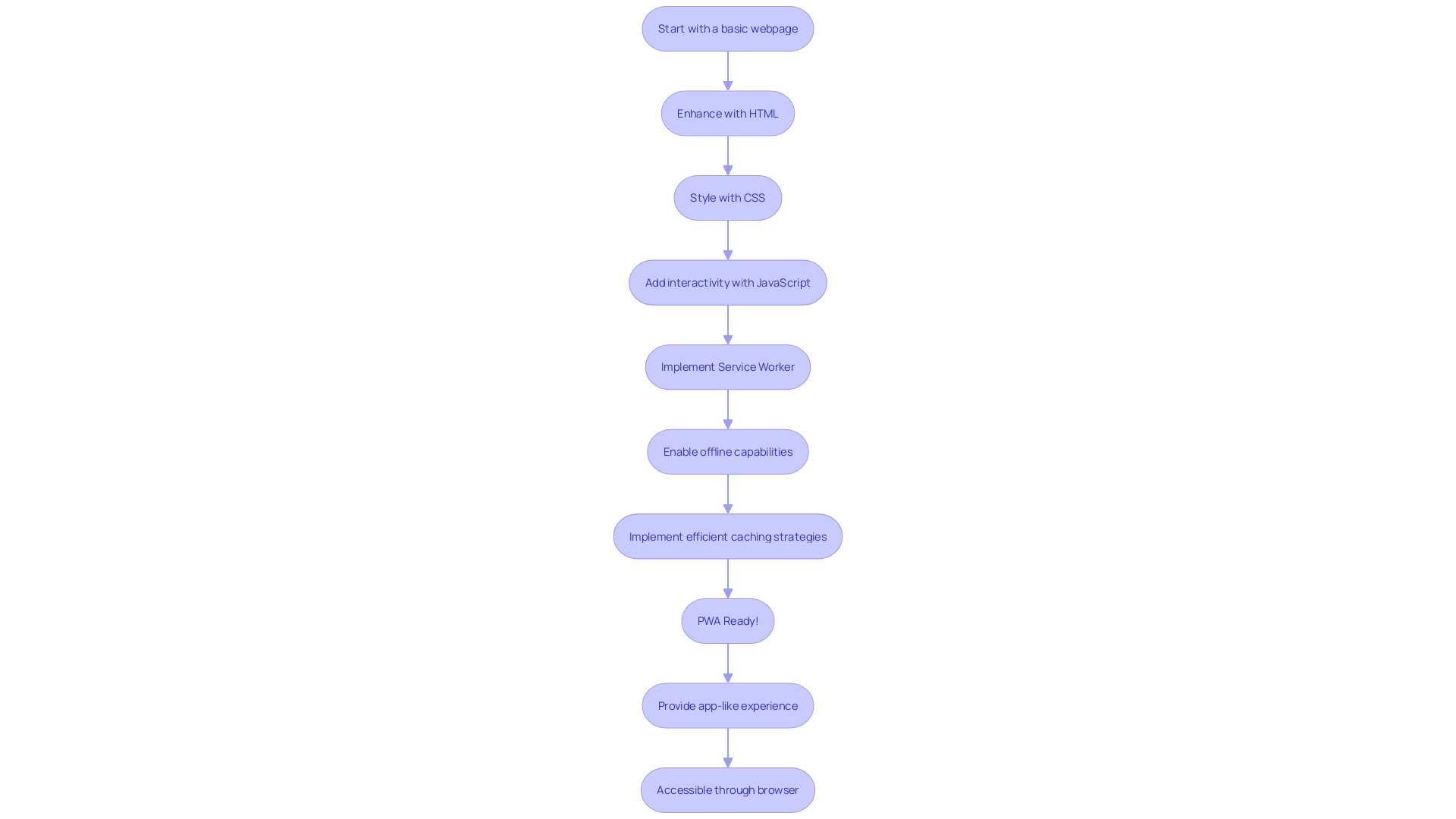
SEO Advantages of PWAs
Progressive Web Applications are transforming the landscape of online business by merging the best of web and mobile app features to deliver an exceptional user experience. They're built using web technology, which means they're inherently search engine friendly, allowing for ease of crawling and indexing by search engines. Such an integrated approach enhances online visibility, crucially driving organic traffic to e-commerce platforms.
Through the examination of competitor traffic and keywords, along with the enhancement of current content, the utilization of progressive web applications can greatly enhance SEO endeavors. They're designed to work flawlessly across all devices, ensuring a consistent and engaging experience for all, which is a key factor in SEO rankings. Additionally, with their offline functionalities, progressive web applications offer continuous access to content, further solidifying their search engine optimization advantage by enhancing interaction and session durations—both favorable indicators to search engines.
As the digital marketplace evolves, it is essential to stay ahead of the curve with advanced technologies like Progressive Web Applications. Not only do they provide a smooth, application-like encounter to individuals but also contribute to better search rankings, making them an essential tool for achieving success in online business.
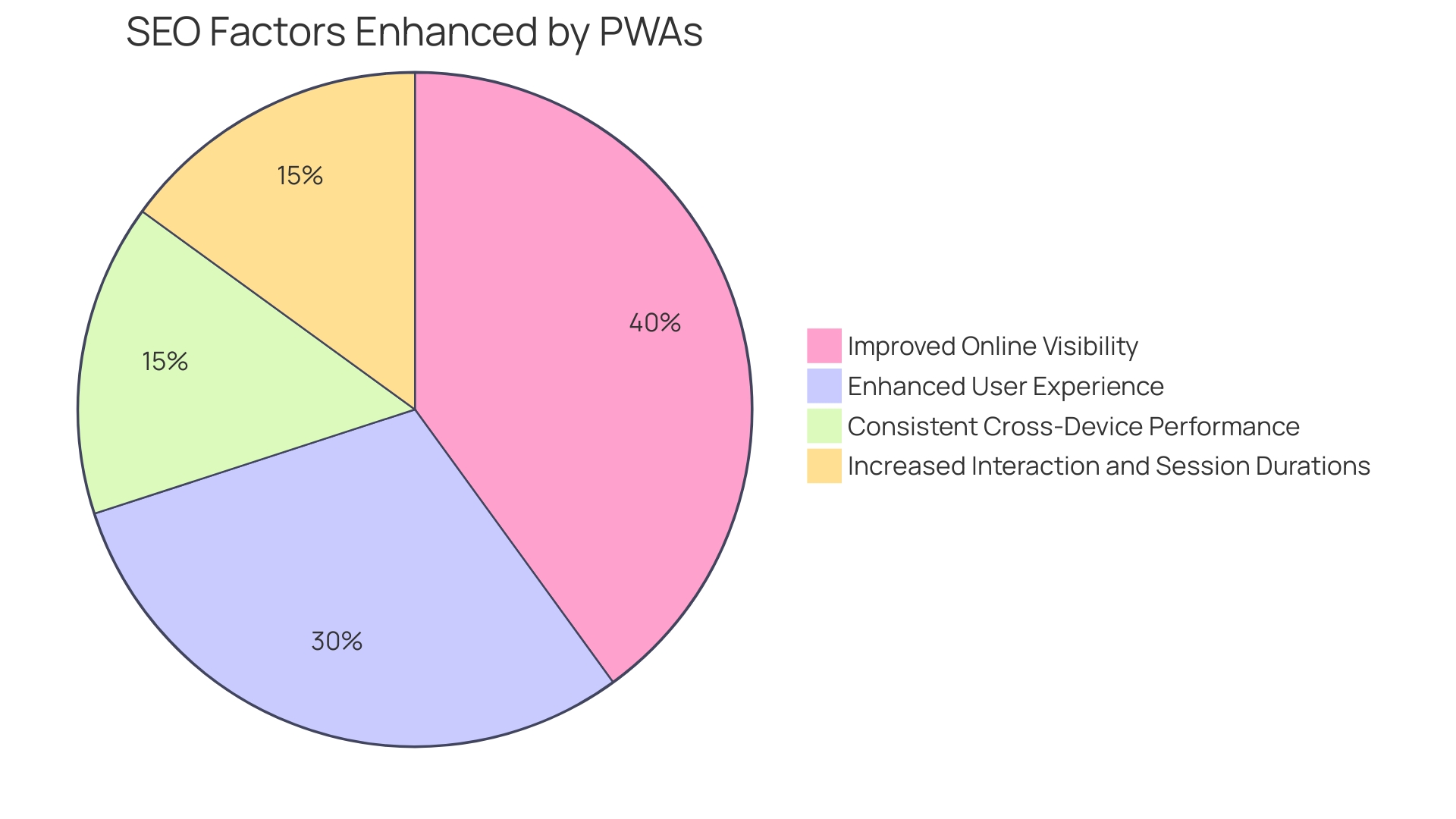
Future Trends in PWAs for E-commerce
Advanced web applications are revolutionizing the online business environment, providing smooth, mobile-friendly store solutions that are gaining popularity worldwide. By enabling a web browser to provide a user interface similar to that of an application, these web-based solutions are more than just a passing fad; they represent a forward-thinking investment in the future of e-commerce. They enable businesses to engage with a broader audience, thanks to their compatibility across devices and platforms, without the need for downloading a traditional app.
When examining the thriving field of online business, it is evident that Progressive Web Applications (PWAs) have a crucial impact on shaping customer interactions. Consider, for instance, the groundbreaking checkout-free store in Dublin Airport, where technology similar to that employed in progressive web apps enables a seamless shopping experience. Customers enter the store, pick their items, and leave without the need to queue for payment, demonstrating the kind of immediacy and convenience that Progressive Web Applications can offer.
Moreover, the rapid growth of e-commerce markets, including food, beverages, and household essentials, highlights the increasing demand for digital channels that provide both convenience and speed. These applications address this demand by offering offline capabilities, push notifications, and fast loading times, which are crucial for capturing and retaining customers in today's fast-paced digital world.
As we approach 2024, the excitement surrounding Progressive Web Applications is not just about their current capabilities but also their potential for innovation. Using artificial intelligence and machine learning algorithms, these advanced web applications are poised to provide tailored shopping interactions, meeting the specific tastes and habits of shoppers.
For businesses aiming to remain competitive and prepared for the future, adopting progressive web applications is not only about staying updated with the most recent technologies; it's about delivering an exceptional user experience that fulfills the changing demands of today's online buyers. The future is bright for PWAs in e-commerce, with their ability to revolutionize how businesses connect with customers and streamline the path to purchase.
Conclusion
In conclusion, PWAs have revolutionized e-commerce by providing seamless experiences that bridge the gap between web and native apps. With fast loading speed, offline access, push notifications, responsive design, and easy installation, PWAs enhance the online shopping experience.
PWAs' fast loading speed ensures immediate access to content, improving conversion rates and online presence. Offline access allows users to browse and make purchases even with poor internet connectivity, enhancing the customer experience and potentially increasing sales.
Push notifications in PWAs boost user engagement by delivering timely updates directly to users' devices, keeping the brand top-of-mind and encouraging repeat purchases. Responsive design ensures a consistent and optimized shopping experience across devices, catering to the increasing mobile traffic.
The easy installation process of PWAs simplifies access to online stores, enhancing user engagement and satisfaction. PWAs are cost-effective alternatives to native app development, providing a consistent and effective user experience across platforms.
PWAs offer SEO advantages by being search engine friendly and driving organic traffic to e-commerce platforms. Looking ahead, PWAs will continue to shape customer experiences, with the potential for personalized shopping through AI and machine learning.
In conclusion, PWAs are a game-changer in e-commerce, offering functionality, reliability, and efficiency. By leveraging the key features of PWAs and embracing their cost-effectiveness and SEO advantages, businesses can thrive in the digital marketplace. The future of PWAs in e-commerce is bright, revolutionizing how businesses interact with customers and streamline the path to purchase.





